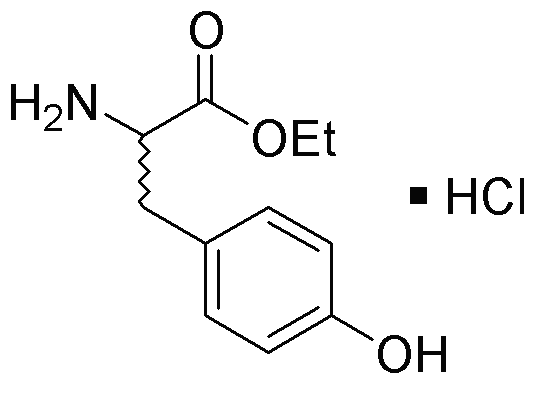DL-Tyrosine ethyl ester hydrochloride is widely utilized in research focused on:
- Nutritional Supplements: This compound is often included in dietary supplements aimed at enhancing cognitive function and mood, as it serves as a precursor to neurotransmitters like dopamine.
- Pharmaceutical Development: It is used in the formulation of drugs targeting neurological disorders, providing a potential therapeutic benefit in conditions such as depression and anxiety.
- Cosmetic Applications: The compound can be found in skincare products due to its antioxidant properties, helping to protect skin cells from oxidative stress and promoting overall skin health.
- Food Industry: It is sometimes added to food products as a flavor enhancer or nutritional additive, contributing to the amino acid profile of protein-rich foods.
- Research in Neuroscience: Researchers utilize this compound to study its effects on brain function and behavior, aiding in the understanding of amino acid metabolism and its role in mental health.
General Information
Properties
Safety and Regulations
Applications
DL-Tyrosine ethyl ester hydrochloride is widely utilized in research focused on:
- Nutritional Supplements: This compound is often included in dietary supplements aimed at enhancing cognitive function and mood, as it serves as a precursor to neurotransmitters like dopamine.
- Pharmaceutical Development: It is used in the formulation of drugs targeting neurological disorders, providing a potential therapeutic benefit in conditions such as depression and anxiety.
- Cosmetic Applications: The compound can be found in skincare products due to its antioxidant properties, helping to protect skin cells from oxidative stress and promoting overall skin health.
- Food Industry: It is sometimes added to food products as a flavor enhancer or nutritional additive, contributing to the amino acid profile of protein-rich foods.
- Research in Neuroscience: Researchers utilize this compound to study its effects on brain function and behavior, aiding in the understanding of amino acid metabolism and its role in mental health.
Documents
Safety Data Sheets (SDS)
The SDS provides comprehensive safety information on handling, storage, and disposal of the product.
Product Specification (PS)
The PS provides a comprehensive breakdown of the product’s properties, including chemical composition, physical state, purity, and storage requirements. It also details acceptable quality ranges and the product's intended applications.
Certificates of Analysis (COA)
Search for Certificates of Analysis (COA) by entering the products Lot Number. Lot and Batch Numbers can be found on a product’s label following the words ‘Lot’ or ‘Batch’.
*Catalog Number
*Lot Number
Certificates Of Origin (COO)
This COO confirms the country where the product was manufactured, and also details the materials and components used in it and whether it is derived from natural, synthetic, or other specific sources. This certificate may be required for customs, trade, and regulatory compliance.
*Catalog Number
*Lot Number
Safety Data Sheets (SDS)
The SDS provides comprehensive safety information on handling, storage, and disposal of the product.
DownloadProduct Specification (PS)
The PS provides a comprehensive breakdown of the product’s properties, including chemical composition, physical state, purity, and storage requirements. It also details acceptable quality ranges and the product's intended applications.
DownloadCertificates of Analysis (COA)
Search for Certificates of Analysis (COA) by entering the products Lot Number. Lot and Batch Numbers can be found on a product’s label following the words ‘Lot’ or ‘Batch’.
*Catalog Number
*Lot Number
Certificates Of Origin (COO)
This COO confirms the country where the product was manufactured, and also details the materials and components used in it and whether it is derived from natural, synthetic, or other specific sources. This certificate may be required for customs, trade, and regulatory compliance.


